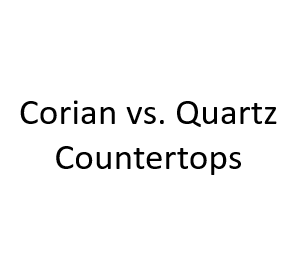When it comes to choosing the perfect countertop material for your kitchen, the options can be overwhelming. Among the top contenders are Corian and quartz countertops, both offering a blend of aesthetic appeal and functionality. In this blog post, we’ll delve into the key differences between Corian vs. quartz countertops to help you make an informed decision that suits your style, needs, and budget.
Aesthetics and Appearance
Corian countertops are known for their seamless appearance. They are manufactured using acrylic polymer and natural minerals, resulting in a smooth, non-porous surface. Corian offers a wide range of color options, and its seamless integration allows for creative designs and integrated sinks.
On the other hand, quartz countertops are engineered using a mix of natural quartz crystals and resin. The result is a stunning surface that mimics the look of natural stone like granite or marble. Quartz countertops come in various patterns and colors, offering a consistent and uniform appearance that some homeowners prefer.
Durability and Maintenance
When it comes to durability, both Corian and quartz countertops are strong contenders. Corian countertops are resistant to stains, scratches, and heat. However, they can be more susceptible to scratches and dings compared to quartz.
Quartz countertops, thanks to their engineered composition, are extremely durable and resistant to scratches, chips, and stains. They are also non-porous, making them highly resistant to bacterial growth. Unlike natural stone countertops, quartz surfaces don’t require sealing, making maintenance hassle-free.
Cost Considerations
Budget plays a significant role in any remodeling decision. Corian countertops tend to be more affordable than quartz. While prices can vary based on factors like design complexity and color choice, Corian generally comes in at a lower cost per square foot.
Quartz countertops, while offering exceptional durability and aesthetics, tend to be pricier due to their intricate manufacturing process and high-quality materials. However, many homeowners find the investment worthwhile considering the long-term benefits and visual appeal.
Installation and Customization
Both Corian and quartz countertops offer customization options to match your kitchen’s design. Corian can be seamlessly integrated, allowing for creative shapes, edge profiles, and even integrated sinks. This makes it an excellent choice for contemporary and minimalist kitchens.
Quartz countertops, with their engineered composition, can be fabricated to your exact specifications. They are available in various thicknesses and can have different edge profiles. However, the seams on quartz countertops might be more visible compared to the seamless appearance of Corian.
Environmental Impact
For environmentally conscious homeowners, both Corian and quartz countertops have their pros and cons. Corian is non-porous and can be repaired if damaged, potentially extending its lifespan. However, it’s made from a combination of natural minerals and acrylic polymer, which might not align with some eco-friendly preferences.
Quartz countertops contain natural quartz, but the manufacturing process involves resin and energy-intensive production methods. Some quartz brands are making efforts to use sustainable practices and reduce their carbon footprint, so it’s worth researching the origin of the quartz you’re considering.
Conclusion
In the Corian vs. quartz countertops debate, there’s no one-size-fits-all answer. Your decision will ultimately depend on your budget, style preferences, and how you intend to use your countertops. Corian offers a seamless and versatile look at a more affordable price point, while quartz provides a durable and elegant surface with a wide range of design possibilities.
Before making your decision, it’s crucial to visit showrooms, request samples, and consider the overall design and functionality of your kitchen. Both Corian and quartz countertops have their merits, and by carefully evaluating your priorities, you can choose the countertop material that will enhance your kitchen’s beauty and functionality for years to come.

